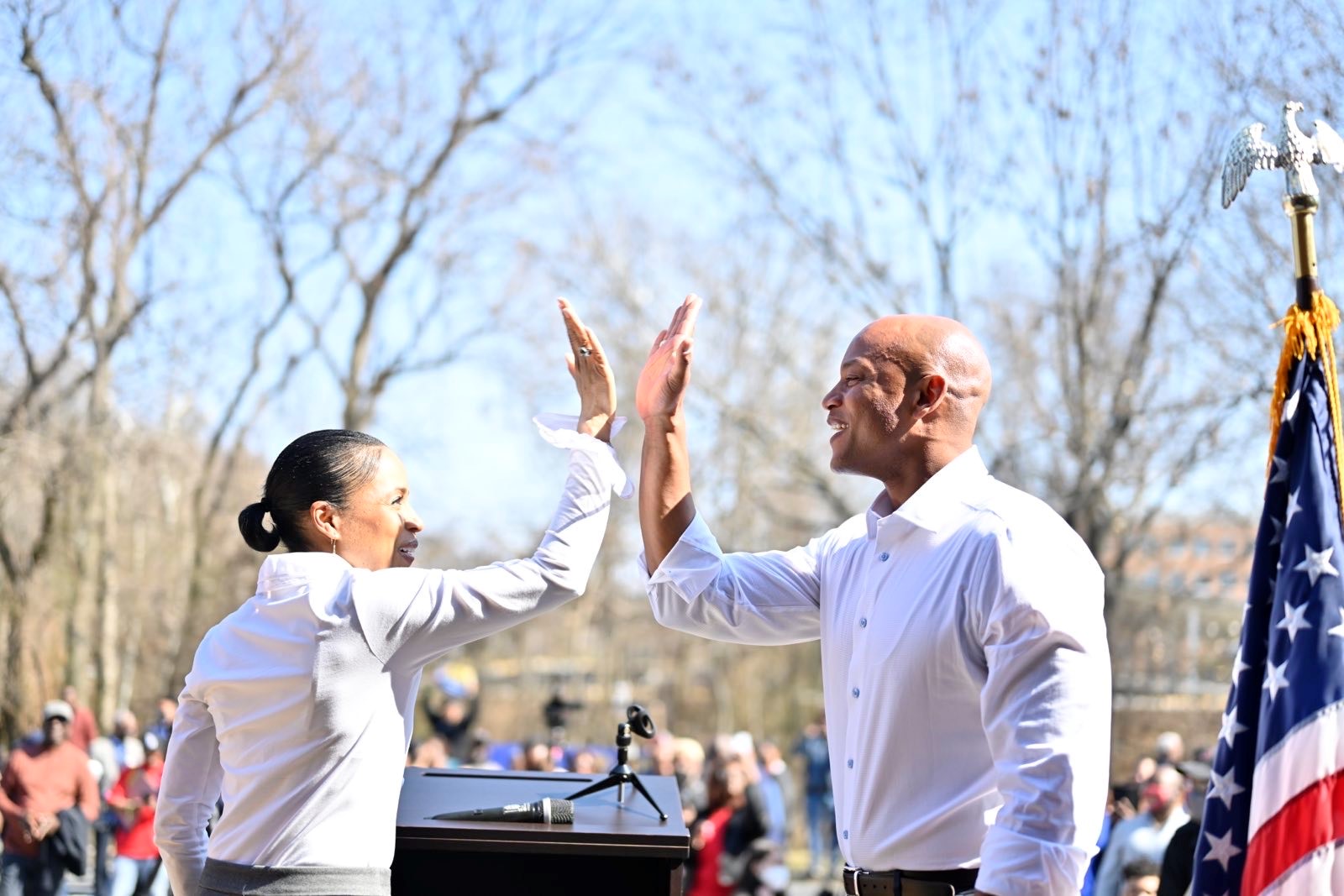Remote Voting in the U.S. House Hits a Second Anniversary, But it May Be Its Last

After two years of a temporary provision to allow remote voting in the U.S. House, the top 36 users of the proxy voting system are all Democrats, though Republicans have also taken advantage of it.
Proxy voting was meant to keep crowds of House members smaller and thereby limit the spread of COVID-19, back in the early days of the pandemic. The first proxy votes were cast on May 27, 2020.
But some members used it while running for higher office or attending political events, undermining the legitimacy of the system and potentially giving fuel to Republicans who could seek to end proxy voting if they retake the chamber in this fall’s election.
“That sort of threatens to ruin the practice for the folks who really need it,” said Molly Reynolds, a senior fellow in governance studies at the Brookings Institution.
Proxy voting is extended for 45 days at a time and currently has been set by House Speaker Nancy Pelosi to expire on June 28.
According to a database of proxy votes compiled by Cronkite News/Arizona PBS, the top 20 users of the vote-by-proxy through April 2022 were all Democrats. They are:
- Al Lawson of Florida
- Donald Payne of New Jersey
- Frederica Wilson of Florida
- Bobby Rush of Illinois
- Ann Kirkpatrick of Arizona
- Grace Napolitano of California
- Grace Meng of New York
- Raúl Grijalva of Arizona
- Katie Porter of California
- Alan Lowenthal of California
- Mark DeSaulnier of California
- Eddie Bernice Johnson of Texas
- Tony Cárdenas of California
- Bonnie Watson Coleman of New Jersey
- Albio Sires of New Jersey
- Lois Frankel of Florida
- Ted Lieu of California
- Donald McEachin of Virginia
- Lucille Roybal-Allard of California
- Chellie Pingree of Maine
The top Republican, according to the data, was Idaho’s Russ Fulcher. With 176 votes by proxy representing less than one-quarter of his votes over the past two years, Fulcher ranked 37th overall.
Grijalva, the chairman of the House Natural Resources Committee, and Johnson, the chairwoman of the House Science, Space and Technology Committee, are the only committee leaders in the top 20.
Among the Maryland delegation, Rep. David Trone (D) used the proxy voting process most frequently, 142 times, which amounts to about 20% of votes cast since the policy change.
Like other lawmakers, Trone cited health concerns for his decision.
“In February, Congressman Trone had knee replacement surgery. He experienced complications that led to an extended hospital stay,” his communications director, Sasha Galbreath, said in a statement. “As a cancer survivor with a compromised immune system his risk of exposure to COVID is greater than normal. In an abundance of caution, he decided to use the remote voting systems to lower his exposure to COVID during his recovery.”
Rep. Kweisi Mfume (D) voted by proxy 86 times.
“Congressman Mfume maintains one of the highest voting records in Congress, casting his vote 99% of the time over the last 25 months since returning to Congress — that is well over 800 floor votes,” his chief of staff, Eric Bryant, said in a statement. “Under the guidance of the Attending Physician of the U.S. House of Representatives, Congressman Mfume casts his vote by proxy on a limited number of days (there are up to 20 floor votes on any given day) when the risk of contracting coronavirus or potentially spreading coronavirus indicates it is in the best interest of the other members of Congress to do so.”
Other Maryland representatives have also taken advantage of proxy voting: Dutch Ruppersberger (71 times), Anthony Brown (56), Steny Hoyer (53), Jamie Raskin (14) and John Sarbanes (2).
The only state lawmaker to not cast a proxy vote is Rep. Andrew Harris (R).
Health cited
Members who used proxy voting most frequently and responded to questions all said their proxy voting habits were related to health concerns, either because the members themselves or those close to them were at increased risk of poor outcomes if they contracted COVID-19:
- Payne spokesman Patrick Wright said: “The Congressman is a diabetic and diabetes is one of the highest ‘at-risk’ factors for catching COVID-19. He has utilized proxy voting to continue his service and work for his constituents in the 10th Congressional District while still protecting his health and safety.”
- Frankel, through a spokeswoman, said: “I have used proxy voting as a public health precaution to minimize COVID-19 exposure for myself and others, especially my 96-year-old mother.” She added: “I used the time away from travel and in-person voting for many, many Zoom meetings with stakeholders, helping to guide them to relief through the COVID-19 crisis and a variety of other meetings we used to have in-person.”
- McEachin spokesman Shahid Ahmed said: “Health challenges the Congressman has faced have made him more susceptible to COVID-19.” Ahmed added, “Out of an abundance of caution, he has used proxy voting, especially when we see an uptick in coronavirus cases.”
- Through a spokesman, Grijalva, who has underlying health concerns and has caught COVID-19 twice, sent a written statement: “Throughout the pandemic, proxy voting has been a tool for Members to keep themselves, other Members and their families safe from exposure to COVID-19. COVID-19 has shown us that Congress can adapt, and with the use of secure technology, continue to conduct the people’s business while spending more time serving their community in their districts. Using both the proxy voting process and remote hearings have afforded members the opportunity to be more accessible and available to their constituents.”
Fulcher was diagnosed with renal cancer last year.
Other lawmakers did not respond to messages.
In her research, Reynolds found that the two greatest predictive factors, other than party, for how often a member would vote by proxy were the distance from a member’s district to Washington and age.
Republicans oppose proxy voting but some use it
House Republicans opposed the concept of voting by proxy and challenged the practice in court, eventually losing in the U.S. Supreme Court.
The numbers show Democrats are generally more likely to vote by proxy more often, and Republicans are more likely not to vote by proxy at all.
Of the 115 members since May 2020 who have never cast a proxy vote, 98 are Republicans. Michigan Libertarian Justin Amash also did not cast a proxy vote before he left office in January 2021.
But 149 House Republicans have cast at least one remote vote, meaning Republicans who have proxy voted outnumber those who have not.
Still, Republican Leader Kevin McCarthy spearheaded the suit to block the practice and Republicans generally have sought to undo pandemic restrictions, which could mean proxy voting’s days are numbered if the GOP retakes the House majority in this fall’s elections.
In a statement emailed by a spokesman, Wisconsin Republican Mike Gallagher, who has never cast a vote by proxy, criticized members who used the practice — especially those whose absences were unrelated to the pandemic. Gallagher called on Republicans to halt the practice if they control the House next year.
“Members are lying to their constituents when they submit proxy statements saying that it is the pandemic — not space launches, political conferences, or trips on Air Force One — that keeps them from conducting their sworn duty on the House floor,” Gallagher said.
“It’s destroying Congress and further eroding trust in this institution,” he added. “When Republicans take back the House, they must end this charade and require all members to be present in Washington to do the work that the American people sent us here to do.”
More than a dozen Republicans used proxy voting to attend the Conservative Political Action Conference last year. Those members include Lauren Boebert of Colorado, Ted Budd and Madison Cawthon of North Carolina, Mark Green of Tennessee, Paul Gosar of Arizona, Mike Kelly of Pennsylvania and Greg Steube of Florida.
Democratic U.S. Reps. Charlie Crist of Florida, Kai Kahele of Hawaii and Thomas Suozzi of New York have all recorded substantial numbers of proxy votes while they run for governor of their home states.
Reynolds said she expected Republicans to end proxy voting if they take the majority. That change would have its positives and negatives.
It has been useful for members with COVID-19 or other serious health conditions to continue their jobs during the pandemic, but proxy voting can also hurt the overall health of the House by depriving members of opportunities to build relationships, Reynolds said.
Enabling members to vote from anywhere could encourage them not to come to Washington at all, she said.
“Time spent in the district is important and valuable, and it’s a real part of what members do,” she said. “But being in Washington is also part of what members do. And portraying time spent in the Capitol as unnecessary to do the job feeds this perception that the institution is a place to be avoided.”
Beyer helps out colleagues
The Cronkite database also tracked the members who cast votes on behalf of their colleagues. One member, Virginia Democrat Don Beyer, led that category by a considerable margin.
As of the end of April, Beyer had cast 2,209 votes on behalf of colleagues, including several on behalf of Trone. New Jersey Democrat Frank Pallone cast the second-most, with 1,683. Raskin was among the top ten lawmakers most likely to cast proxy votes on behalf of others, doing so 766 times.
Other Maryland representatives cast proxy votes on behalf of others: Brown (185 times), Mfume (78 times), and Trone (20 times).
Beyer’s office cited his district’s proximity to the Capitol as part of the reason his colleagues have so often turned to him for proxy-voting help.
As a committee chairman, of the Joint Economic Committee, and a member of both the Congressional Progressive Caucus and the moderate New Democrat Coalition, the fourth-term Democrat has developed many relationships in the House, Beyer spokesman Aaron Fritschner said in an email.
“Rep. Beyer is honored that his colleagues have placed this trust in him, and it has given him some good stories to tell (for instance, casting multiple votes to impeach former President Trump),” Fritschner wrote.
“Rep. Beyer hopes that as our society adapts to the changing nature of the pandemic and the health situation hopefully improves, votes in the House will return to being more in-person,” Fritschner added. “He is a big believer in the in-person relationships that Members of Congress form in the process of legislating.
“But while conditions and rules necessitate proxy voting, Rep. Beyer will continue to help his colleagues as he has done since mid-2020.”
Editor’s Note: This story was updated to include a statement from Raúl Grijalva of Arizona.





 Creative Commons Attribution
Creative Commons Attribution